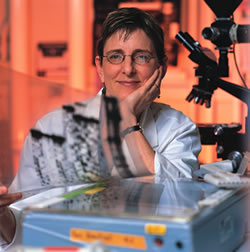
"Dr. Byrd told me I could either do nothing, I could continue surveillance and see how it progresses, or I could have the entire pancreas removed," Mayer says.
A total pancreatectomy removes the pancreas, part of the small intestine, often part of the stomach, the bile duct, the gallbladder, spleen and most of the lymph nodes in the area. Because Mayer's pancreas was still precancerous, doctors felt that the rest of her abdominal organs could be saved. But she would live the rest of her life as a diabetic.
While doctors couldn't be certain the precancerous cells would turn into cancer, once they did become malignant, it would be too late to save Mayer.
"My children are 23 and 20, and I want to be a grandmother someday," Mayer says. "It really was no question of if I would have my pancreas taken out, but when. I didn't want to mess with it, so we made the appointment."
Last November Mayer underwent a six-hour pancreatectomy, instantly turning her from a patient with a high pancreatic cancer risk into an insulin-dependent diabetic. Having seen what the former can do, she's glad to take the latter.
"The last time I saw my mom, she had lost all of her hair, and she was essentially a skeleton with skin on it," Mayer remembers. "The last time I saw my brother was two months before he died. Knowing how my mom looked, I wanted to remember him as he was, before he deteriorated so much.

UW Gastroenterologist Teri Brentnall is part of the world's first pancreatic cancer surveillance program. Photo by Kathy Sauber.
"As for me, I'm not a brittle diabetic. My blood sugars are not much different than they were. I have an insulin pump. It's basically an artificial pancreas that gives me the amount of insulin I need day and night," she says. But Mayer knows the long-term risks of diabetes: heart disease, stroke, blindness, kidney failure, amputations and nerve damage.
With her children (and hoped-for grandchildren) in mind, she also donated blood and pancreatic juices to research, knowing that information might one day save their lives—or at least keep them from having to endure the shock and uncertainty of many pre-cancer tests.
Mayer's case is typical of the 35 patients from 13 families in the UW surveillance program. Each has at least two relatives who had pancreatic cancer, or else a first-degree relative who developed the disease younger than the age of 50.
"The patients in the surveillance program are doing very well," Brentnall says. "They are all alive without any development of pancreatic cancer. Everybody whose pancreas has been removed had pre-cancer present in the organ but had not yet developed cancer. We hope to make surveillance programs even better in the future. Ideally it would be best if we could identify patients who are on the brink of developing cancer by using a blood test or by taking a sample of fluid from the pancreas. Currently a tissue biopsy is required."
Mayer was back to work full-time in the first week of 2002, overseeing 21 employees at the clinic. She says she's having less trouble with the diabetes than she is with her stomach, which has had trouble emptying completely. She can never eat fatty or spicy foods again, and she must consume antacids every day to control a constant heartburn.
"Dr. Byrd has a great deal of experience taking care of familial pancreatic cancer patients," Brentnall says. "Sheri's surgery left no complications other than the expected loss of pancreatic function and the need to use insulin and digestive enzymes."
"I check my blood sugars four to six times a day, and the endocrinologist thinks I'm doing wonderfully," Mayer says. "I'll continue to build up my stamina. Nothing is really messing up my routine."
But the family curse may not be over. Her only living brother—still in South Dakota and two years her junior—is not taking his own fate seriously.
"If I had not promised my older brother that I'd get myself checked, I could have been dead, too," Mayer says. "I feel like my younger brother is living in denial. He's always been the 'it-will-never-happen-to-me' type. He says his doctor told him it wasn't necessary to check for the cancer. But I send him literature all the time."
While her brother avoids any decision, Mayer has already made another life choice. "We've been in Wenatchee for a long, long time. We really love the small town atmosphere, but we decided we needed to make a better life for ourselves," she says.
This April she and her husband left Wenatchee to live in a log cabin near Helena, Mont. They are building it themselves. "I tend to tire out quicker and need more rest," she says, "but that's really a small price to pay." —Scott Holter is a free-lance writer who lives in Seattle. UW Health Sciences Writer Pam Sowers contributed to the reporting of this article.